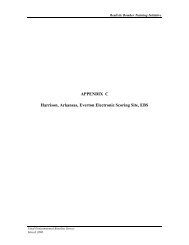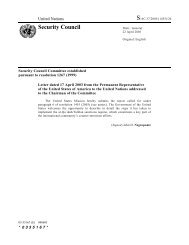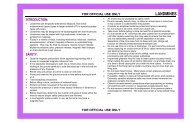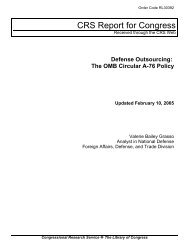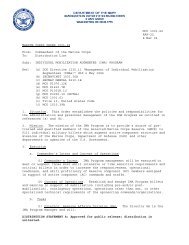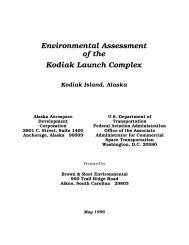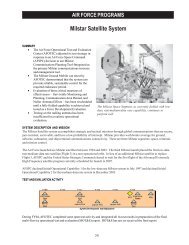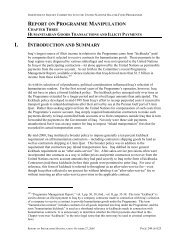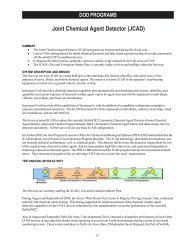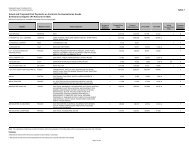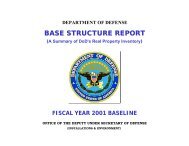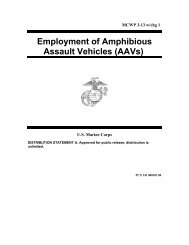- Page 1 and 2:
FOR OFFICIAL USE ONLY DEPARTMENT OF
- Page 3 and 4:
MEMORANDUM FOR DISTRIBUTION SUBJECT
- Page 5 and 6:
Contents (Continued) Climate . . .
- Page 7 and 8:
Contents (Continued) Counterattack.
- Page 9 and 10:
Contents (Continued) Division and R
- Page 11 and 12:
Contents (Continued) Division 122/1
- Page 13 and 14:
Contents (Continued) ZPU-4 Heavy AA
- Page 15 and 16:
Contents (Continued) K-61 Tracked A
- Page 17 and 18:
Contents (Continued) SOHUNG PTG . .
- Page 19 and 20:
North Korea—Political and Economi
- Page 21 and 22:
will likely cling to its outmoded s
- Page 23 and 24:
PYONGYANG Sariwon NORTH KOREA Koson
- Page 25 and 26:
heavy rolling stock, scarcity of he
- Page 27 and 28:
Chinese characters were used before
- Page 29 and 30:
ROK governments hold that the MDL i
- Page 31 and 32:
North Korea ELEVATION IN FEET RUSSI
- Page 33 and 34:
Major Rivers Name Length Navigable
- Page 35 and 36:
one travels. Observation in the nor
- Page 37 and 38:
110 100 PUSAN, South Korea 35 o 10'
- Page 39 and 40:
110 100 90 TAEJON, South Korea 36 o
- Page 41 and 42:
110 100 90 PYONGYANG, North Korea 3
- Page 43 and 44:
110 100 90 YANGDOK, North Korea 39
- Page 45 and 46:
Thunderstorms usually occur about 2
- Page 47 and 48:
agents at this time, dispersion pat
- Page 49 and 50:
Effects of Vegetation on Military O
- Page 51 and 52:
The DPRK enforces a mandatory consc
- Page 53 and 54:
The North Korean Air Force (NKAF) T
- Page 55 and 56:
The transport fleet has some 1950s-
- Page 57 and 58:
The DPRK's attack submarine invento
- Page 59 and 60:
to hinder a CFC counterattack. Pers
- Page 61 and 62:
The primary strength that the DPRK
- Page 63 and 64:
3. Overwhelming Firepower: Employ c
- Page 65 and 66:
coastal, rear area, or capital defe
- Page 67 and 68:
large quantities of armored personn
- Page 69 and 70:
KAESONG-MUNSAN CHORWON VALLEY EAST
- Page 71 and 72:
■ Close combat fires: Designed to
- Page 73 and 74:
The NKA uses two primary tactical f
- Page 75 and 76:
10 FLANK GUARD 8 KILOMETERS 6 4 REC
- Page 77 and 78:
NKA Attack Formation NKA combat org
- Page 79 and 80:
NKA Tactical Frontages and Depths i
- Page 81 and 82:
7 6 5 I I I 4 KILOMETERS 3 I I I I
- Page 83 and 84:
12 11 10 XX MAIN 9 I I I I I I I KI
- Page 85 and 86:
the main force is committed under t
- Page 87 and 88:
attack, it can also take place in t
- Page 89 and 90:
Secondary Attack (Fixing) I I I 1 I
- Page 91 and 92:
Night Attack The NKA views night op
- Page 93 and 94:
NKA armor and infantry forces are e
- Page 95 and 96:
The combined-arms theory of the NKA
- Page 97 and 98:
The supporting artillery unit or ar
- Page 99 and 100:
Air Defense Support to Offensive Op
- Page 101 and 102:
assets at the service and national
- Page 103:
Generally, when in the defense, the
- Page 106 and 107:
Defensive Frontages and Depths Unit
- Page 108 and 109:
8 7 6 I I X REAR KILOMETERS 5 4 I I
- Page 110 and 111:
3d Phase Line X X I I I 2d Phase Li
- Page 112 and 113: ■ Regiment's second echelon occup
- Page 114 and 115: Escape From Encirclement (Breakout)
- Page 116 and 117: Final protective fires will consist
- Page 118 and 119: artillery and tanks) and command an
- Page 120 and 121: SOF strategic missions will include
- Page 122 and 123: NORTH KOREAN TUNNEL OPERATIONS UNDE
- Page 124 and 125: SECTION 3 RANK INSIGNIA AND UNIFORM
- Page 126 and 127: North Korean Army Rank Insignia Mar
- Page 128 and 129: Winter Service Overcoat Service Uni
- Page 130 and 131: Winter Full Dress Uniform (Officers
- Page 132 and 133: Full Dress Uniform (Officers) Servi
- Page 134 and 135: SECTION 4 ORGANIZATIONAL CHARTS XXX
- Page 136 and 137: XXX C & S XX XX XX XX XX X X X X X
- Page 138 and 139: XXX C & S X X X X X REAR SVC I I BR
- Page 140 and 141: I I I I I I I I I HQ 120 107/140 MR
- Page 142 and 143: I HQ HQ INFANTRY COMPANY Total INF
- Page 144 and 145: I I I HQ I MSGR & COMM I WIRE I RAD
- Page 146 and 147: I I I SA-5 I Command & Control I I
- Page 148 and 149: I I I SA-2 I Command & Control I I
- Page 150 and 151: I I Tech I I I I HHC Obstacle Const
- Page 152 and 153: X 122 MRL I HQ I I 122 MRL 122 MRL
- Page 154 and 155: X I HQ I I 130 130 130 I I 152 152
- Page 156 and 157: I I 120 I I I H&S 120 120 120 MORTA
- Page 158 and 159: I I I I HQ I HQ TANK BATTALION Tota
- Page 160 and 161: X I I LT HQ & CMD I I LT HQ&S I LT
- Page 164 and 165: Disease Risks Diseases Contracted F
- Page 166 and 167: Hepatitis A: Hepatitis A infection
- Page 168 and 169: within the dwellings. In rural area
- Page 170 and 171: ■ Protect yourself against mosqui
- Page 172 and 173: ■ Maintain as strict a standard o
- Page 174 and 175: BMP-1 (KORSHUN) Type: Amphibious, a
- Page 176 and 177: BTR-152 Type: Wheeled armored perso
- Page 178 and 179: MT-LB Type: Amphibious, armored tra
- Page 180 and 181: VTT-323 (M-1973) Type: The VTT 323
- Page 182 and 183: BTR-50 Type: Amphibious, armored pe
- Page 184 and 185: PT-76 Type: Amphibious tank Armamen
- Page 186 and 187: TYPE-63 LIGHT AMPHIBIOUS TANK Type:
- Page 188 and 189: T34/85 Type: WWII vintage medium ta
- Page 190 and 191: T-55 Type: Medium tank Armament: 10
- Page 192 and 193: T-62 (CH’ONMA-HO) Type: Medium ta
- Page 194 and 195: Type: Caliber: Max Effective Range:
- Page 196 and 197: Type: Caliber: Max Effective Range:
- Page 198 and 199: ATGM SYSTEMS North Korea has the Ru
- Page 200 and 201: AT-3/SAGGER The AT-3 is both a MCLO
- Page 202 and 203: AT-5/SPANDREL The AT-5 is a SACLOS
- Page 204 and 205: Type: Ammunition: Max Effective Ran
- Page 206 and 207: B-11 RCL Type: 107mm smoothbore ant
- Page 208 and 209: Type: Max Range: Max Rate of Fire:
- Page 210 and 211: Type: Max Range: Max Rate of Fire:
- Page 212 and 213:
Type: Max Range: Max Rate of Fire:
- Page 214 and 215:
12 ROUND 107MM ROCKET LAUNCHER Type
- Page 216 and 217:
LINE DIAGRAM UNAVAILABLE Type: Othe
- Page 218 and 219:
240MM ROCKET LAUNCHER M-1985 & 240M
- Page 220 and 221:
Type: Range: Warhead: CEP: Other: S
- Page 222 and 223:
Type: Tactical Antiair (AA) Range:
- Page 224 and 225:
Type: Tactical Antiair (AA) Range:
- Page 226 and 227:
LINE DIAGRAM UNAVAILABLE Type: Tact
- Page 228 and 229:
Type: Tactical Antiair (AA) Range:
- Page 230 and 231:
LINE DIAGRAM UNAVAILABLE Type: Tact
- Page 232 and 233:
TWIN 57MM SELF-PROPELLED AA GUN Typ
- Page 234 and 235:
Type: Tactical Antiair (AA) Range:
- Page 236 and 237:
SA-2 B/C/D/E/F GUIDLINE The SA-2 is
- Page 238 and 239:
SA-5 GAMMON The SA-5 is a long rang
- Page 240 and 241:
SA-14 The SA-14 is a short range, m
- Page 242 and 243:
STINGER The Stinger is a short rang
- Page 244 and 245:
TYPE 64 7.62MM PISTOL The Type-64 i
- Page 246 and 247:
MAKAROV 9MM PISTOL The Makarov can
- Page 248 and 249:
GP-25 GRENADE LAUNCHER The GP-25 is
- Page 250 and 251:
TYPE-56 SEMIAUTOMATIC CARBINE (SKS)
- Page 252 and 253:
PPSM1943 SUBMACHINEGUN (TYPE-54 CHI
- Page 254 and 255:
RPK-74 LIGHT MACHINEGUN The RPM-74
- Page 256 and 257:
RPD LIGHT MACHINEGUN The RPD is a g
- Page 258 and 259:
SMG MACHINEGUN The SMG is an air co
- Page 260 and 261:
ROKS-3 FLAMETHROWER The ROKS-3 is a
- Page 262 and 263:
LINE DIAGRAM UNAVAILABLE 60MM TYPE-
- Page 264 and 265:
LINE DIAGRAM UNAVAILABLE 160MM M-43
- Page 266 and 267:
RG-42 FRAGMENTATION HAND GRENADE Th
- Page 268 and 269:
UNKNOWN FRAGMENTATION HAND GRENADE
- Page 270 and 271:
RDG-1 SMOKE HAND GRENADE The RDG-1
- Page 272 and 273:
TYPE-S SMOKE HAND GRENADE The Type-
- Page 274 and 275:
RPG-43 ANTITANK HAND GRENADE The RP
- Page 276 and 277:
ATM-72 ANTITANK MINE The ATM-72 is
- Page 278 and 279:
TMD-44 ANTITANK MINE The TMD-44 is
- Page 280 and 281:
TM-41 ANTITANK MINE The TM-41 is an
- Page 282 and 283:
PMD-6 ANTIPERSONNEL MINE The PMD-6
- Page 284 and 285:
LINE DIAGRAM UNAVAILABLE PMR-3 MECH
- Page 286 and 287:
BAT-M DOZER The BAT-M dozer has a h
- Page 288 and 289:
LINE DIAGRAM UNAVAILABLE TPP PONTOO
- Page 290 and 291:
MTU-20 ARMORED VEHICLE-LAUNCHED BRI
- Page 292 and 293:
K-61 TRACKED AMPHIBIOUS VEHICLE The
- Page 294 and 295:
SELF RELIANCE 68 NA (KAENSAENG) The
- Page 296 and 297:
VICTORY 58 (SUNGNI) The Victory 58
- Page 298 and 299:
ZIL-157 The ZIL-157 is one of the p
- Page 300 and 301:
ISUZU HTW11 This 6x6 8 ton Japanese
- Page 302 and 303:
ZIL-131 The ZIL-131 was produced by
- Page 304 and 305:
INDEPENDENCE (CHAJU) The North Kore
- Page 306 and 307:
LINE DIAGRAM UNAVAILABLE M-65 PROTE
- Page 308 and 309:
MODEL RDP-4V BACKPACK DECONTAMINATI
- Page 310 and 311:
MODEL DP-1a/b AREA SURVEY METER The
- Page 312 and 313:
MI-2 HOPLITE The Mi-2 is a twin tur
- Page 314 and 315:
MI-8 HIP The Mi-8 is a medium utili
- Page 316 and 317:
HUGHES 500 D/E The Hughes 500 is a
- Page 318 and 319:
F-6 (MIG-19) FARMER The DPRK has ab
- Page 320 and 321:
LINE DIAGRAM UNAVAILABLE F-7 The DP
- Page 322 and 323:
SU-7B FITTER A The DPRK has about 2
- Page 324 and 325:
IL-28 BEAGLE The DPRK has about 80
- Page 326 and 327:
AN-24 COKE The DPRK has about 6 of
- Page 328 and 329:
Type: Freqency Band: Maximum Range:
- Page 330 and 331:
FAN SONG A/B/C/E/F A/B C/E F Type:
- Page 332 and 333:
KNIFE REST A/B/C A B/C Name: P-8 Do
- Page 334 and 335:
Name: Type: Freqency Band: Maximum
- Page 336 and 337:
Name: Type: Freqency Band: Maximum
- Page 338 and 339:
OTHER RADAR SYSTEMS RADAR BACK TRAP
- Page 340 and 341:
14.5mm (staggered pt, stbd) Lattice
- Page 342 and 343:
Tripod mast VERSION 2 37mm Wheelhou
- Page 344 and 345:
14.5mm 37mm Pylon mast Wheelhouse 8
- Page 346 and 347:
Tripod mast d.c. 57mm 25mm 25mm 57m
- Page 348 and 349:
Pole mast d.c. 25mm position 25mm 1
- Page 350 and 351:
d.c. 57mm 25mm (pt, stbd) Crow's ne
- Page 352 and 353:
LOA/Beam/Draft: Missile Launchers:
- Page 354 and 355:
DRUM TILT FC radar Latticed tripod
- Page 356 and 357:
Pole mast Wheelhouse 53cm TT (pt, s
- Page 358 and 359:
DRUM TILT Pylon mast Wheelhouse 30m
- Page 360 and 361:
DRUM TILT Pylon mast Wheelhouse 30m
- Page 362 and 363:
LINE DIAGRAM UNAVAILABLE KOWAN ASR
- Page 364 and 365:
LINE DIAGRAM UNAVAILABLE NAMPO A/B
- Page 366 and 367:
LOA/Beam/Draft: Propulsion: Missile
- Page 368 and 369:
ALCM-82 SHALLOW WATER MINE The ALCM
- Page 370 and 371:
PDM-2 SHALLOW WATER MINE The PDM-2
- Page 372 and 373:
CSSC-2 SILKWORM The CSSC-2 is a Chi
- Page 374 and 375:
APPENDIX B: International Time Zone
- Page 376 and 377:
Units of Volume Multiply by To find
- Page 378 and 379:
APPENDIX D: Korean Language Pronunc
- Page 380 and 381:
Turn around. Lie face down. Hands b
- Page 382 and 383:
Request Help Can you help me? do-wa
- Page 384 and 385:
Ordinary Situations Time What time
- Page 386 and 387:
Pictures forbidden chwall-yong koom
- Page 388 and 389:
D-11 Bread bang Bridge ta-ree Briga
- Page 390 and 391:
D-13 Face o-gool Facility shee-sol
- Page 392 and 393:
Light Light Location Look Look for
- Page 394 and 395:
Preparation Pro-communist Pro-gover
- Page 396 and 397:
Transport Transport plane Travel pe
- Page 398 and 399:
Numbers 1 il/ha na 2 ee/dul 3 sam/s
- Page 400 and 401:
■ Do not leave sensitive personal
- Page 402 and 403:
What To Do If You Are Detained Most
- Page 404 and 405:
a target without ramifications to t
- Page 406 and 407:
sion. Maintaining emotional control
- Page 408 and 409:
The normal adult male heart rate is
- Page 410 and 411:
3. With the middle finger on the no
- Page 412 and 413:
If you must use a tourniquet, place
- Page 414 and 415:
First Aid 1. Lay patient on back, e
- Page 416 and 417:
30 25 A WATER REQUIREMENTS, LITERS
- Page 418 and 419:
with water, and fan the casualty. H
- Page 420 and 421:
added as it gets colder and taken a
- Page 422 and 423:
increased in the presence of fatigu
- Page 424 and 425:
■ MEDEVAC as soon as possible. Pr
- Page 426 and 427:
ite which usually affects the nose,
- Page 428 and 429:
G-1 APPENDIX G: International Telep



